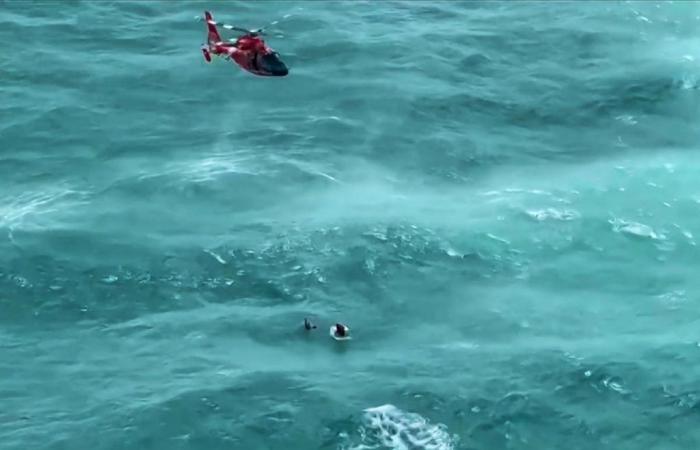The sailor was able to survive by clinging to a floating cooler.
AFP
The US Coast Guard announced the dramatic rescue of a boat captain who survived the storm by clinging to a cooler in the Gulf of Mexico after the ship sank caused by Hurricane Milton.
Milton left at least 16 dead in its wake in Florida, authorities said, with about 2.5 million homes and businesses remaining without power Friday despite a less intense disaster than expected.
“We did not experience the worst scenario, but we were affected,” Ron DeSantis, governor of this southeastern American state, said on Friday.
The death toll stands at at least 16: six in St. Lucie County, four in Volusia County, three across Polk and Orange and Citrus counties, two in the city of St. Petersburg, and one in Tampa, according to local authorities.
Milton reached the west coast of Florida on Wednesday evening as a Category 3 hurricane, on the Saffir-Simpson scale of 5, then made its way inland, before gaining the Atlantic the following morning.
Its passage caused numerous tornadoes and devastated a region already devastated by the powerful Hurricane Helene about two weeks earlier.
A landscape of desolation
In Siesta Key, in Sarasota Bay where the hurricane made landfall, residents who had evacuated gathered Friday to see the damage. “We’re told it was better than we feared, but when I look closer and take a drive, I see we’ve been hit very hard,” said Mark Horner, a 67-year-old resident. , at AFP.
Here, Milton left a landscape of desolation, uprooting trees, flooding streets, tearing off at least one roof, and strewing the locality with various debris.
Florida, the third most populous state in the country and which attracts many tourists, is used to hurricanes. But climate change, by warming the seas, makes their rapid intensification more likely and increases the risk of more powerful phenomena, scientists warn.
Warming increases its power
According to an analysis released Friday by the World Weather Attribution (WWA) science network, Milton’s rainfall was about 20 to 30 percent higher due to climate change and its winds were 10 percent more intense. Without global warming, the hurricane would have made landfall in Florida as a category 2 instead of 3 on the Saffir-Simpson scale, which measures the intensity of the winds, concluded the WWA.
However, for each increase in category, the risk of damage is generally multiplied by four, estimates the American Oceanic and Atmospheric Observation Agency (NOAA).
If the damage is impressive in places, the worst seems to have been avoided, the hurricane having “weakened before making landfall”, noted the governor of the state on Thursday, estimating that the marine submersion “was not as significant than that observed for Hurricane Helene.
Search operations continued Friday, and the Coast Guard announced the spectacular rescue of a boat captain who survived the storm by clinging to an ice chest in the Gulf of Mexico.
The day before, Joe Biden had called on the population to “stay indoors” for the moment, in particular to avoid “downed power lines, debris, and washed out roads”.
The two hurricanes, which occurred a few weeks before an extremely close presidential election, took on a political dimension, with Republicans and Democrats arguing over disaster aid.
(afp)






